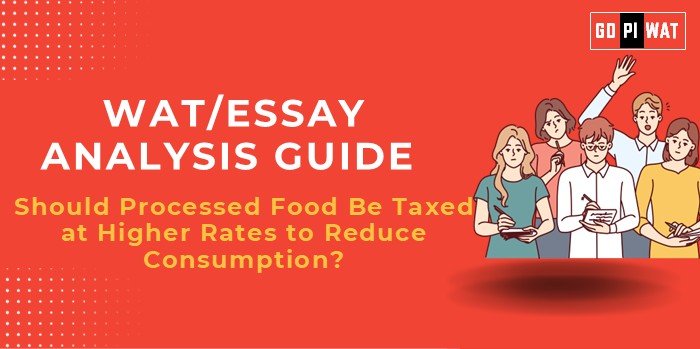📋 WAT/Essay Analysis Guide: Should Processed Food Be Taxed at Higher Rates to Reduce Consumption?
🌐 Understanding the Topic’s Importance
This essay examines taxation’s role in public health, connecting with themes like economic equity, behavioral economics, and corporate responsibility—key for B-school discussions on policymaking.
🕒 Effective Planning and Writing
- Time Allocation:
- Planning: 5 minutes
- Writing: 20 minutes
- Review: 5 minutes
- Preparation Tips:
- Research global case studies.
- Note arguments and counterpoints.
✍️ Introduction Techniques for Essays
- Contrast Approach: “While processed foods dominate modern diets, they are also linked to rising obesity and chronic disease rates, sparking debates over the need for corrective taxation.”
- Solution-Based: “Taxing processed foods could help mitigate public health crises while funding nutrition education and healthcare systems.”
📄 Structuring the Essay Body
1. Achievements:
- Tax benefits in Mexico and Hungary.
- Public health improvements.
2. Challenges:
- Regressive impact on low-income families.
- Resistance from the food industry.
3. Future Outlook:
- Pair taxation with subsidies for healthy alternatives.
- Foster public-private collaborations.
🔚 Concluding Effectively
- Balanced Conclusion: “Processed food taxes offer a promising tool but must be integrated with inclusive health strategies to ensure equitable outcomes.”
- Global Comparison Conclusion: “Lessons from Mexico and Hungary demonstrate the need for tailored approaches, balancing public health goals with economic considerations.”
💡 Sample Short Essays
1. Balanced Perspective:
“Taxation of processed foods can deter unhealthy eating habits but must be coupled with public awareness campaigns and support for low-income groups.”
2. Solution-Oriented:
“Higher taxes on processed foods, alongside subsidies for healthy options, can transform dietary patterns and reduce chronic diseases.”
3. Global Comparison:
“Global examples like Mexico’s sugar tax highlight the effectiveness of processed food taxes, though equity concerns remain.”


